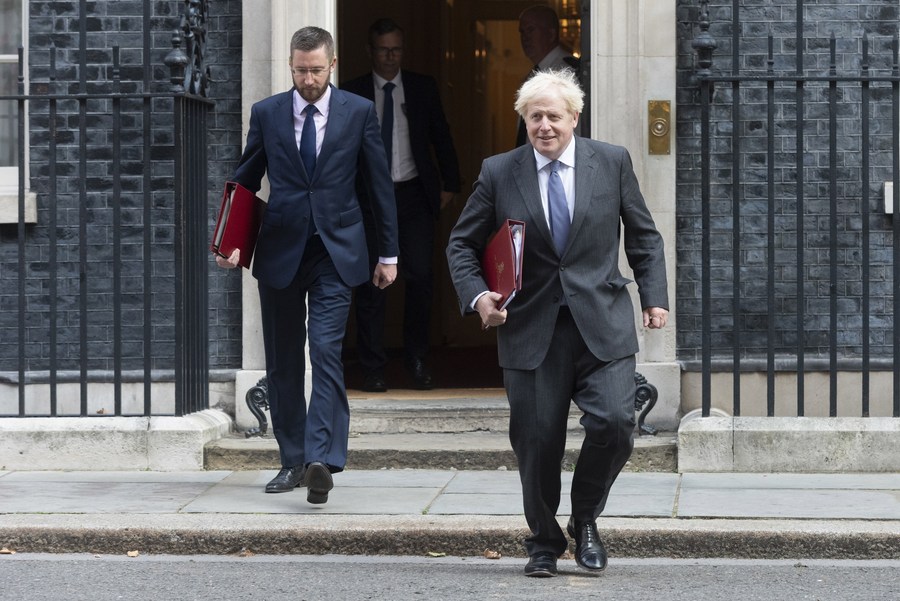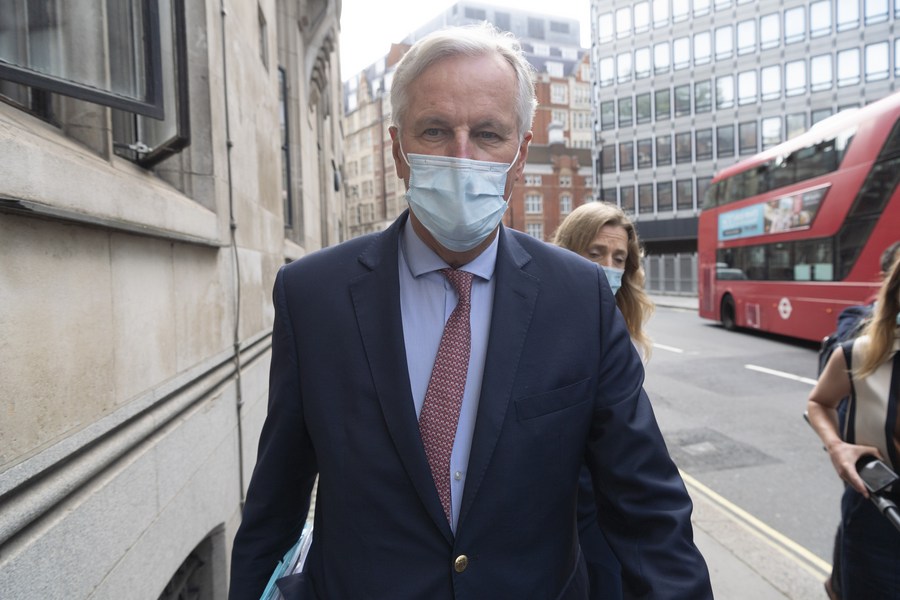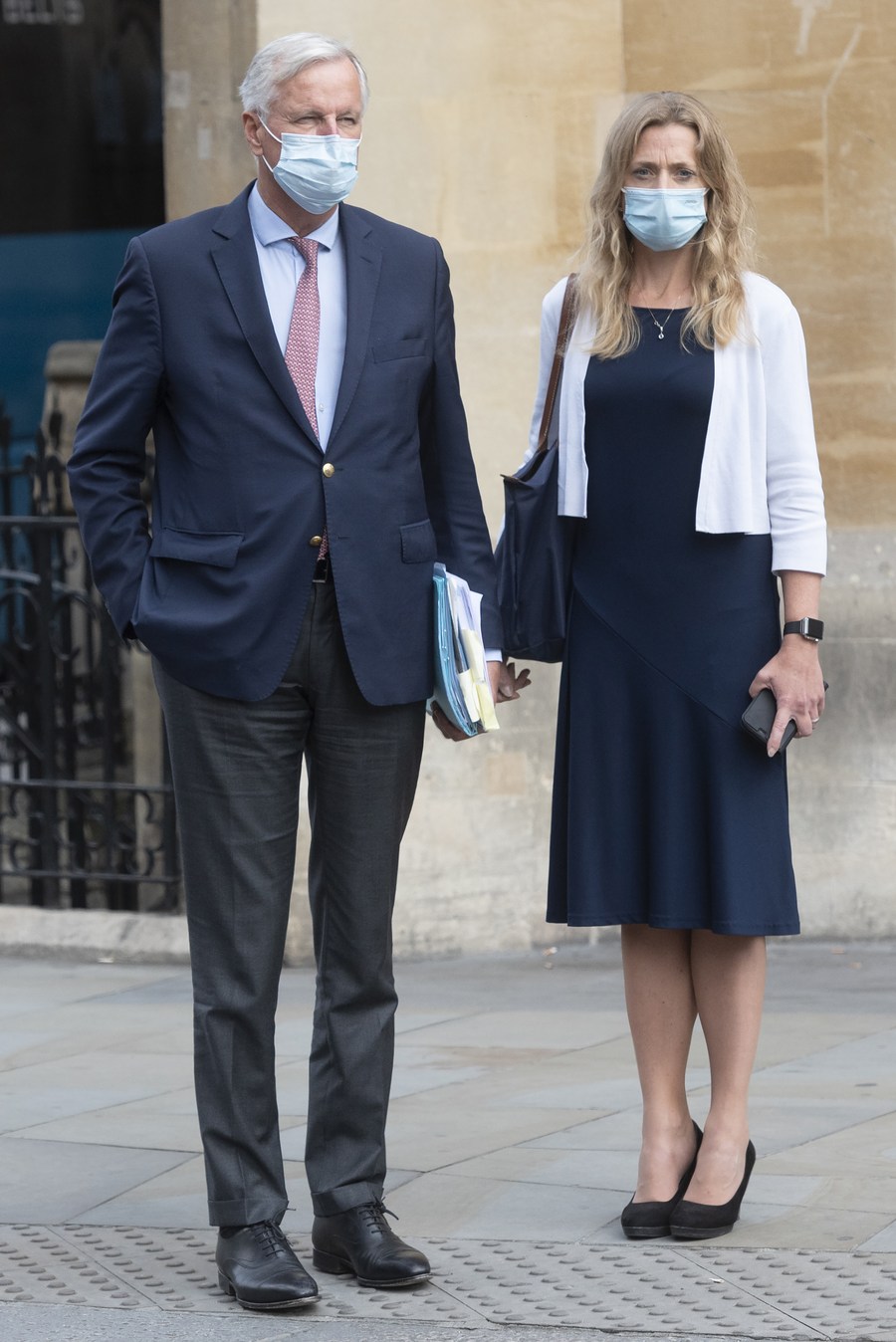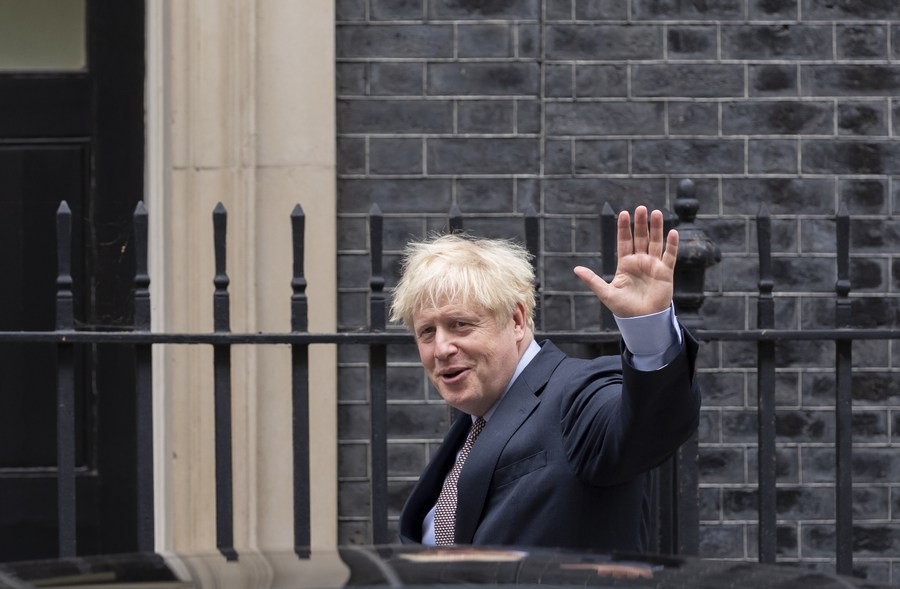
British Prime Minister Boris Johnson (R) leaves 10 Downing Street for a Cabinet Meeting in London, Britain, Sept. 15, 2020. (Photo by Ray Tang/Xinhua)
Rajneesh Narula, the John H. Dunning Chair of International Business Regulation at the Henley Business School, University of Reading, told Xinhua that he anticipated the bill could face difficulties in the House of Lords (upper house of the British parliament).
"My reading from that is that this is probably the brinkmanship more than hard Brexit and people have been assured in private that this is not going to lead to a hard Brexit," he said.
LONDON, Sept. 20 (Xinhua) -- Downing Street has reached a deal with some Tory MPs who are unhappy with the controversial UK Internal Market Bill, as British Prime Minister Boris Johnson has agreed to give the parliament a vote before he could use the power to override parts of his Brexit agreement with the European Union (EU).
Analysts say the move could head off a potential rebellion over the issue but it still faces a bumpy road ahead as it fails to address concerns over the damage the bill could do to the Britain-EU trade talks as well as Britain's international reputation.
Rajneesh Narula, the John H. Dunning Chair of International Business Regulation at the Henley Business School, University of Reading, told Xinhua that he anticipated the bill could face difficulties in the House of Lords (upper house of the British parliament).
Johnson's Internal Market Bill addresses part of the Withdrawal Agreement -- the Northern Ireland Protocol, which looks to prevent a hard border between Britain's Northern Ireland and the Republic of Ireland.

EU chief Brexit negotiator Michel Barnier walks to Britain's Department for Business, Energy and Industrial Strategy in London, Britain, Sept. 10, 2020. (Photo by Ray Tang/Xinhua)
If the bill is passed and becomes law, it would give British ministers the power to modify or "disapply" rules relating to the movement of goods between Northern Ireland and the rest of Britain, if London and Brussels are unable to strike a trade deal.
For Narula, the assumption that the bill will not kick into law unless there is a no-deal situation is an important factor to consider during the debate.
"That is an important rider because it changes everything," said Narula, adding that an agreement between Britain and the EU is still possible under the current circumstances.
Narula suggested that Johnson's tactics could be one of two things: he could be gambling in a game of brinkmanship, where the British government is trying to push the EU to come to an agreement and see how far they can push the regional block; or it could be a genuine attempt to force a hard Brexit.
"My reading from that is that this is probably the brinkmanship more than hard Brexit and people have been assured in private that this is not going to lead to a hard Brexit," he said.
"As long as there's a substantive agreement and an agreement that comes up with zero tariffs, there will be no breach of the Good Friday Agreement," he added, referring to a peace agreement reached in April 1998 between the British and Irish governments, and most of the political parties in Northern Ireland.

EU chief Brexit negotiator Michel Barnier (L) walks to Britain's Department for Business, Energy and Industrial Strategy in London, Britain, Sept. 10, 2020.(Photo by Ray Tang/Xinhua)
However, the proposed bill has drawn strong international reactions.
The EU has called for Britain to drop the controversial bill or face legal actions. Across the Atlantic, U.S. Democratic presidential nominee Joe Biden has warned that Britain must honor 1998 Northern Ireland peace agreement as it withdraws from the EU or there would be no separate U.S. trade deal.
"The Good Friday Agreement is close to almost every American administration. And they were instrumental in pushing the Good Friday Agreement and getting the Good Friday Agreement signed and implemented," Narula said.
The Internal Market Bill passed its first hurdle in the House of Commons (lower house of the parliament) on Monday as MPs backed it by 340 votes to 263 in its second reading.
Those who support the deal say it contains vital safeguards to protect Britain if negotiations on a future trade deal break down. But a number of critics, including Conservative MPs, have warned it risks damaging Britain's reputation by breaching international law.
But whether or not this is a game of brinkmanship to satisfy the right-wing base of his party and followers, Johnson has placed Britain's reputation to follow international law at risk, the expert said.

British Prime Minister Boris Johnson leaves 10 Downing Street for the House of Commons in London, Britain, Sept. 9, 2020. (Xinhua/Han Yan)■



